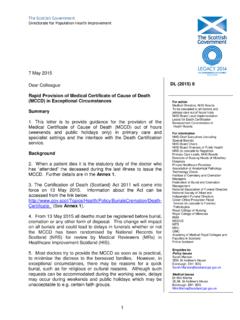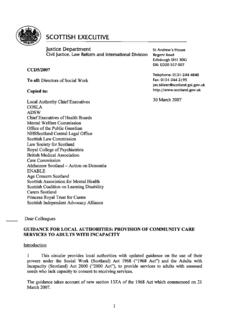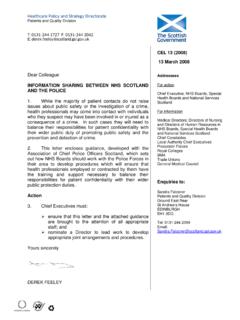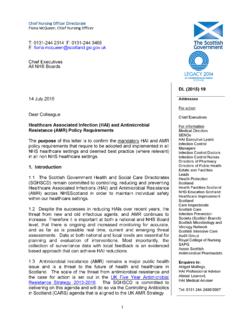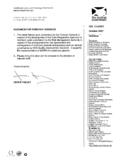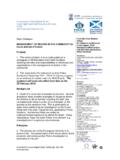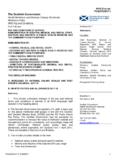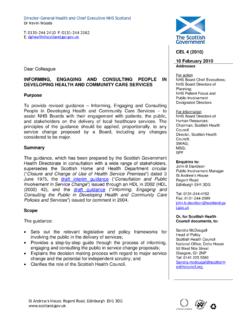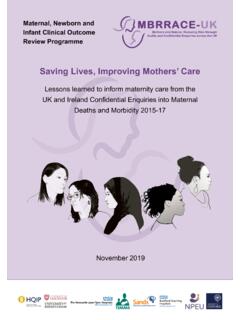Transcription of NHS SCOTLAND NATIONAL FRAMEWORK FOR SERVICE …
1 NHS SCOTLAND NATIONAL FRAMEWORK FOR SERVICE CHANGE LONG TERM CONDITIONS ACTION TEAM REPORT Final The Long Term Conditions Action Team was one of 11 Action Teams set up by the NATIONAL FRAMEWORK Advisory Group. The Action Team was asked to consider the health care of the people of SCOTLAND with one or more chronic diseases. It was composed of a multi-professional group involved in scottish health care (see appendix 1) and it consulted with a range of lay organisations representing patients.
2 It also invited submissions from Chief Executives of Health Boards giving examples of current innovations in long term conditions management. It met on five occasions between August 2004 and January 2005. 2 EXECUTIVE SUMMARY BACKGROUND Long term conditions require ongoing medical care, limit what people can do, and are likely to last longer than one year. They are common in the scottish population, more common in people living in deprived circumstances, more common in older people and, because SCOTLAND s population is ageing, they will become even more common.
3 If we do not continue to improve our management of long term conditions at a local level, demand on acute services will continue to increase. VISION Our challenge is to provide the best quality of care within our finite resources for our citizens who may suffer from long term conditions now and in the future. The aim is to keep people as well as possible for as long as possible. Our vision is that by 2025 many long term conditions will be being prevented by health education measures as well as advances in preventive health care but it is likely that the proportion of our population who will suffer from long term conditions will increase because of the anticipated increase in older people.
4 Those citizens who develop long term conditions will have their problems identified early, will be fully informed and involved in decisions about their care and will receive proactive, structured care based on clear evidence of effectiveness. Our staff will be well trained in patient centred approaches and will be working in strong multidisciplinary teams that span the current divides between primary and secondary care and health and social care. Communication and monitoring of care will have been greatly enhanced by advances in information technology and will be facilitated by a single electronic patient record linking all care providers.
5 The care needs of our population at a NATIONAL and local level will be predictable and services will be tailored to those needs. Most care will be available in local settings but specialist opinion will be rapidly accessible when required. In-patient care will rarely be required because more specialised local teams will respond rapidly when people develop acute problems with their long term condition. When someone is admitted to hospital for acute care, their discharge will be rapid and supported by further specialised local teams with access to a range of resources to facilitate recovery and rehabilitation.
6 KEY RECOMMENDATIONS The following are the key recommendations that the Action Team believes need to be followed now to achieve our vision. AND INFORMATION 1. All care agencies should use a single electronic record system utilising the CHI as the unique patient identifier. As a first step all health care records 3(primary, secondary, pharmacy, nursing homes, hospice etc) should be converted to use the CHI. 2. NATIONAL and local protocols should be agreed to ensure appropriate access to the single electronic record for healthcare, social care, education, independent sector carers etc.
7 3. Information systems that support the day to day management of patients should be developed for use with the single electronic record. 4. The role of the scottish Intercollegiate Guideline Network in developing NATIONAL guidelines for the management of single long term conditions should be strengthened. Their work should include assessment of the resource implications of their implementation and how to implement them better at a local level. Evidence for optimal management of people with more than one long term condition should be sought.
8 5. Intelligence systems that support the predictive modelling of our services should be developed in partnership between Health Boards, Information and Statistics Division SCOTLAND , Academic Centres, Workforce Planning Groups etc. to ensure that the right data are collected, properly analysed and fed back to Health Boards to ensure that the services that are required are available when needed. OF CARE 6. A FRAMEWORK of audit standards, guidance and best practice statements that will support the management of long term conditions should be developed by NHS Quality Improvement SCOTLAND .
9 As a first step, a series of outcome indicators for successful long term condition management should be developed which may include: quality of life measures; use of hospital beds; outpatient attendances; GP consultations; admissions due to drug related problems; pharmacy consultations; chronic disease management clinics; indicators in the GMS contract; and shift of care closer to home. 7. The Quality and Outcomes FRAMEWORK (QoF) of the GMS contract should be reviewed to assess its impact on long term conditions management and revised if necessary.
10 8. An Assessment Tool should be evaluated as a means of establishing baseline performance in long term condition management in Community Health Partnerships (CHPs). 9. Outcomes should be established for long term condition management in CHPs. These will build on the indicators described under Quality of Care but will be tailored to individual CHPs by taking account of local circumstances such as levels of deprivation. HEALTH PARTNERSHIPS 10. Clinical leaders should be more fully engaged in CHPs 11.
